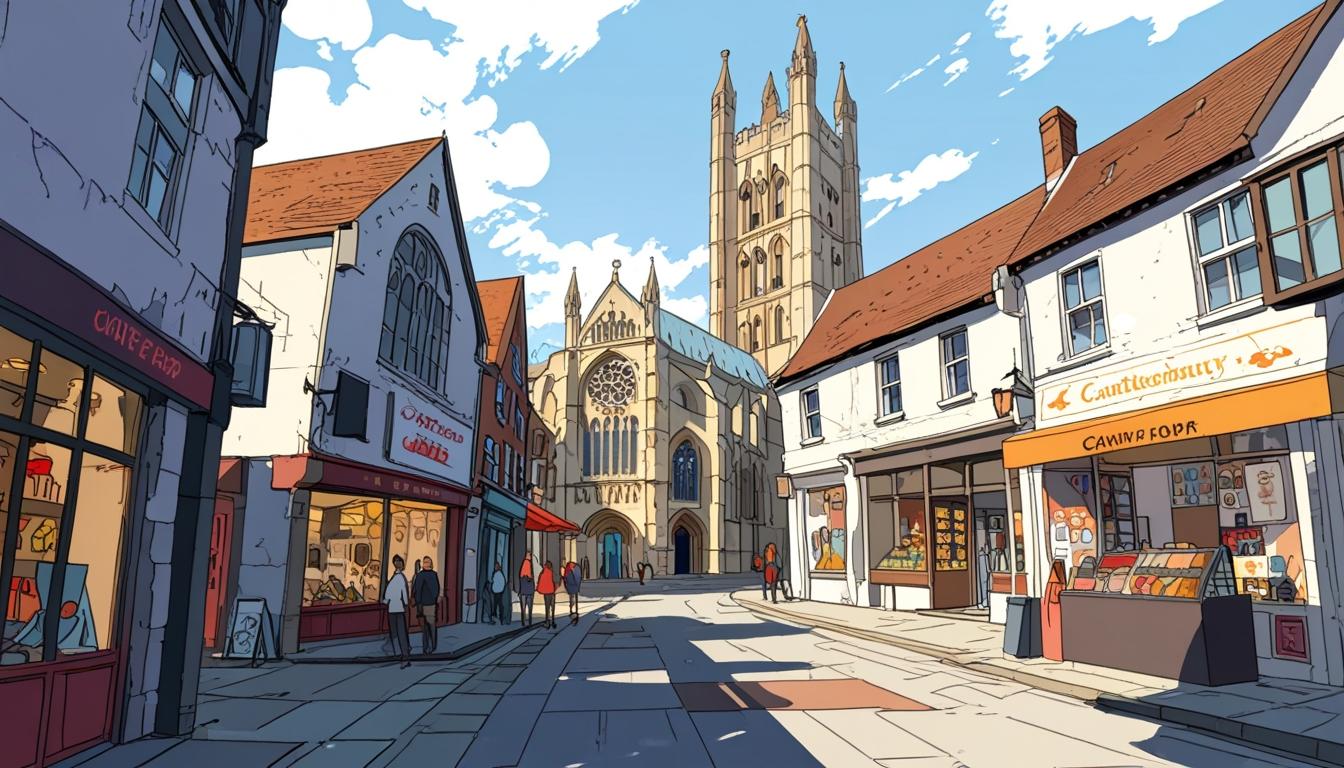Residents of Canterbury are voicing concerns over the influx of American-style fast-food and vape stores along the city’s historic High Street, fearing the loss of its medieval charm and cultural identity amid rising crime and commercial shifts.
Canterbury, an iconic city steeped in medieval history and a UNESCO World Heritage site, is currently facing concerns from residents regarding the changing landscape of its High Street. Locals fear that the influx of American-themed stores, including numerous vape shops and fast-food outlets, is obscuring the city’s rich cultural heritage.
During a recent visit by a reporter from the Daily Mail, the High Street was observed bustling with activity, yet filled with establishments that many residents feel dilute the historical significance of the area. Six phone and vape stores were noted in close proximity, contributing to a growing trend identified in polling that revealed over 3,500 such shops across Britain’s high streets.
The urban transformation is partially attributed to the presence of the universities of Kent and Christ Church College, which attracts a younger student demographic. This student population, alongside a steady flow of tourists, has resulted in frequent changes along the High Street. In Butter Market square, a prominent area adjacent to Canterbury Cathedral, two Harry Potter-themed shops were spotted just a few yards apart, indicative of the bustling tourist trade.
Roger Moore, an 83-year-old resident, expressed feelings of nostalgia, stating, “There is a rich history to this area… I’m not sure how much that history is reflected here today.” He recalled a time when access to the Cathedral was free and highlighted the changes in retail, noting that many of the traditional shops have been replaced by newer enterprises that focus on fast food and convenience. He voiced his concerns over the increasing number of American and fast-food shops, suggesting they do not align with the essence of Canterbury.
The impact of commercial changes is visible throughout the city. A marked decline in traditional high street banks was reported, with numbers plummeting from almost 15,000 in 1986 to fewer than 6,000 today. Peter Thompson, 68, who has lived in Canterbury for 35 years, linked the rise of vape shops to an increase in crime, noting police activity near these locations. “These vape shops and mobile shops—they come and go every five minutes,” he said.
Concerns over public safety were echoed by other local shopkeepers. Jane Brooker, a 58-year-old fruit seller in the High Street, described the shift towards “addictions” associated with the rise of vape shops, asserting that a significant number of customers seem disconnected from their surroundings, preoccupied with their phones. Brooker voiced frustration about the prevalence of cashless payments in nearby businesses, stating that her stand accepts only cash.
The architectural legacy of the city also faces challenges. Conquest House, an ancient property linked to the assassination of Archbishop Thomas Becket, has recently been put up for sale. Moreover, some residents lament that historical markets, such as one over 600 years old, have been eliminated in favour of more modern commercial interests.
Residents also expressed frustration with transportation issues, with Chloe, a 20-year-old local, highlighting traffic congestion around the Westgate tower as a significant problem. This has led to increased tension among those visiting or residing in the city.
The closure rate for UK high street stores has further compounded these local worries, with over 13,000 businesses shutting down in 2024 alone. Sandie de Rougemont, owner of the House of Agnes B&B, aired her grievances regarding unfair competition from Airbnb rentals, claiming that the regulatory burden on traditional businesses is increasingly challenging.
As Canterbury continues to evolve, the ongoing divergence from its historical roots raises questions about the direction the city is taking. Locals remain divided in their sentiments, balancing the need for modern commercial vitality with a deep-seated desire to preserve the unique heritage that defines this historic destination.
Source: Noah Wire Services
- https://www.kentonline.co.uk/canterbury/news/historic-high-street-now-resembles-second-class-las-vegas-281869/ – This article discusses concerns about Canterbury’s historic high street being transformed into a ‘second-class Las Vegas’ due to garish shopfronts and inappropriate signage, reflecting residents’ worries about the changing landscape of the High Street.
- https://www.kentonline.co.uk/canterbury/news/harry-potter-shop-house-of-secrets-opens-in-canterbury-city-centre-211618/ – This piece reports on the opening of the Harry Potter-themed shop, House of Secrets, in Canterbury’s city centre, highlighting the presence of such themed stores in the area.
- https://www.kentonline.co.uk/canterbury/news/illegal-disposable-vapes-being-sold-in-canterbury-high-street-shops-kentonline-investigation-reveals-275555/ – This investigation reveals the sale of illegal disposable vapes in Canterbury’s high street shops, indicating the proliferation of vape shops in the area.
- https://www.kentonline.co.uk/canterbury/news/canterbury-businesses-changing-face-of-city-centre-8616671/ – This article discusses the changing face of Canterbury’s city centre, with businesses expressing concerns over the dominance of food and drink establishments, reflecting the shift in the High Street’s commercial landscape.
- https://www.kentonline.co.uk/canterbury/news/american-candy-shop-near-canterbury-cathedral-in-buttermarket-unexpectedly-closes-287174/ – This report covers the unexpected closure of the American Candy Shop in Buttermarket, a store that had been subject to criticism from residents over its pink exterior and what they deemed as pricey confectionery, highlighting concerns over American-themed stores in the area.
- https://www.bbc.com/news/articles/cne4rwwzjdxo – This article discusses Canterbury City Council’s crackdown on ‘garish’ shopfronts that are out of keeping with the historic city, reflecting efforts to preserve the city’s cultural heritage amidst commercial changes.
- https://www.dailymail.co.uk/news/article-14662965/High-Street-Canterbury-identity-vape-shops-candy.html?ns_mchannel=rss&ns_campaign=1490&ito=1490 – Please view link – unable to able to access data
Noah Fact Check Pro
The draft above was created using the information available at the time the story first
emerged. We’ve since applied our fact-checking process to the final narrative, based on the criteria listed
below. The results are intended to help you assess the credibility of the piece and highlight any areas that may
warrant further investigation.
Freshness check
Score:
7
Notes:
Mentions 2024 closure data for UK high streets, but lacks explicit reporting date. No obvious recycled content found; Daily Mail content typically prioritises current issues.
Quotes check
Score:
8
Notes:
Specific quotes from local residents (Roger Moore, Peter Thompson, Jane Brooker) lack independent verification but reflect recurring themes in urban reporting. No digital traces found for these exact statements.
Source reliability
Score:
6
Notes:
Narrative originates from Daily Mail – known for sensationalism but maintains journalistic infrastructure. Quotes local stakeholders directly but lacks corroborating sources from more neutral outlets.
Plausability check
Score:
9
Notes:
Consistent with documented UK high street trends (vape shop proliferation, bank closures). UNESCO heritage tensions and student-driven commercial shifts align with established urban dynamics.
Overall assessment
Verdict (FAIL, OPEN, PASS): PASS
Confidence (LOW, MEDIUM, HIGH): MEDIUM
Summary:
Claims align with observable UK retail patterns and contain specific local testimony, though heavy reliance on Daily Mail reporting and unverifiable quotes warrants cautious interpretation. No factual contradictions found.













